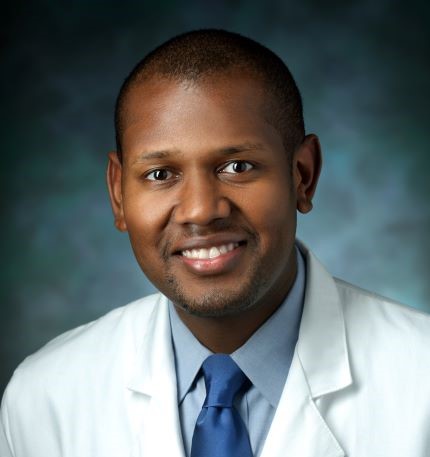We are very pleased to share with you that COAH Core Faculty Dr. Thomas Cudjoe is our Winter 2023 COAH Champion. If you have an opportunity to bask in the presence of his warm smile and speak with him for a few minutes, surely you will recognize qualities such as his genuine concern and sincere compassion for people—particularly older adults, whose interests are at the heart of his life’s work. Known as an expert in social isolation and loneliness among older adults, Dr. Cudjoe was the lead author on two recent papers in this space that connect social isolation with an increased risk for dementia; Johns Hopkins Medicine story here, and NPR story here.
Assistant Professor of Medicine, Dr. Cudjoe is faculty in the Johns Hopkins University Division of Geriatric Medicine and Gerontology, where he is the Robert and Jane Meyerhoff Endowed Professor, and he is a Co-Director for Medicine for the Greater Good. In 2020, Dr. Cudjoe received the Division’s Junior Faculty Teaching Award, and in 2018 he was named one of 125 Hopkins Heroes “Living the Mission” in honor of Johns Hopkins University’s 125th anniversary. Additionally, Dr. Cudjoe is a Center for Innovative Medicine Caryl & George Bernstein Scholar, which sponsors his involvement with the Johns Hopkins University Human Aging Project. And Dr. Cudjoe is the Stakeholder Engagement Core Leader for the university’s AI & Technology Collaboratory for Aging Research.
Beyond these accolades with Johns Hopkins, Dr. Cudjoe serves as a Major in the U.S. Army Reserves Medical Corps, where he was recognized with medals for Commendation, Achievement, and Humanitarian Service. Plus, the Johns Hopkins Medicine Office of Diversity, Inclusion and Health Equity honored Dr. Cudjoe with an Achievers Award for his distinguished military service in 2020 in honor of Veterans Day. (You may be interested in this story about US Army doctors fighting the coronavirus, which features a nice image of Major Cudjoe among Army colleagues and describes an effort to fight COVID-19.)
Tony Teano: Tell us about your background, education, and path to COAH.
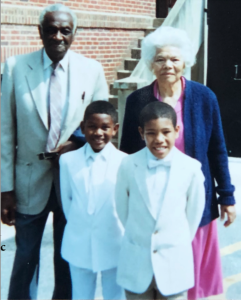
Dr. Cudjoe: I was born in Philadelphia, Pennsylvania, and I grew up in Macon, Georgia. Experiences with grandparents in Georgia and also visiting grandparents in Ghana, were important to appreciating and being interested in what matters to older adults. Also, I think my mother’s advocacy work was formative to my way of thinking early on.
When I went to college, I studied Biology, but I was planning to go to law school. One of my professors urged me to consider medicine. When I came home during the summer following my freshman year, I looked at programs that would expose me to medicine. To get ahead of this for my next summer, I started calling programs and asking about what I needed to do to be a successful applicant, and that’s how I stumbled upon an opening for a summer at Columbia College of Physicians and Surgeons in New York. They reviewed my information and accepted me that same summer. After this program, I thought I would pursue medicine and law to merge my interest in caring, justice, and advocacy. I later decided to pursue public health instead of law and did an MPH in Health Policy at Harvard School of Public Health after my 3rd year of medical school at Robert Wood Johnson Medical School in New Jersey. A course on Issues of Aging exposed me to the complexities of aging policy and solutions. This fascinated me and helped me clarify that I wanted to dedicate my career to caring for and advancing issues related to the health and well-being of older adults. Following medical school, I did residency in internal medicine at Howard University Hospital in Washington, DC, and then came to Baltimore in 2015 to pursue clinical fellowship at Johns Hopkins. Early on in my clinical fellowship, I met with Drs. David L. Roth and Cynthia Boyd and they helped me clarify my goals and obtain funding to support two additional years of research training. During this time, I was fortunate to receive excellent mentorship and sponsorship from Drs. David Roth, Deidra Crews, Roland Thorpe, Cynthia Boyd, Jennifer Wolff, Laura Gitlin, and Sarah Szanton.
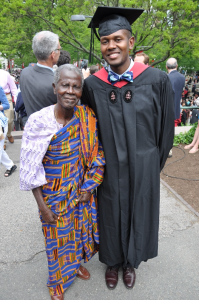
Tony Teano: Why did you choose to go into this field of work?
Dr. Cudjoe: My caregiving experience with my Grandpa was pivotal. While visiting the doctor (Clement Nwosu, MD) with him when I was a freshman in college nurtured the interested that had been planted by one of my college mentors (Dr. Alfred McQueen at Hampton University). These interactions as well as those during medical school and the course during my MPH helped me choose geriatrics.
Tony Teano: What paper are you most known for or most proud of?
Dr. Cudjoe: Epidemiology of social isolation. This was my first paper. It remains my most cited paper. It helped establish me in the field.
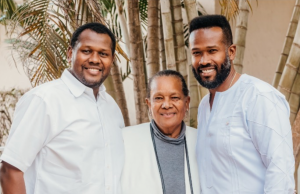
Tony Teano: This feature will be published during Black History Month. Could you please tell us who your Black Hero is?
Dr. Cudjoe: Loretto Madeleine Grier-Cudjoe, DMD. My Mom is my hero. I have deep love and respect for her on so many levels. Her parenting and ongoing work has been critical for how I think and navigate life.
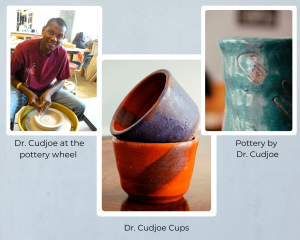 Tony Teano: What are the top items on your bucket list?
Tony Teano: What are the top items on your bucket list?
Dr. Cudjoe: To visit the Great Pyramids of Giza.
Tony Teano: Tell us about your hobbies… what renews you?
Dr. Cudjoe: I enjoy making pottery—engaging in ceramics!
Tony Teano: You recently published several articles that connected social isolation with dementia. Could you tell us more about your findings and how to intervene, please?
Dr. Cudjoe: Among older adults in the United States, social isolation is common. One in four adults experience isolation, and that is associated with a higher hazard of incident dementia over nine years. There were no observed differences in the association between social isolation and dementia by race and ethnic. Social isolation may be a valuable and modifiable risk factor to target interventions for reducing dementia risk across diverse racial and ethnic groups.
Tony Teano: This is significant! And the good news is that the risk may be mitigated through social connection—wonderful insights everyone should know as they check in with the older adults in their sphere, near or far. Dr. Cudjoe, thanks so much for taking the time to speak with me about your work and your world.
We thank Dr. Cudjoe for allowing us this opportunity to share this up-close and personal look into his personal and professional worlds. He is an amazing, thoughtful leader in geriatric medicine, and COAH is proud to celebrate his success! To keep up-to-date with Dr. Cudjoe, follow him on Twitter @tkmcudjoe.
By Anthony L. Teano, MLA
Communication Specialist
